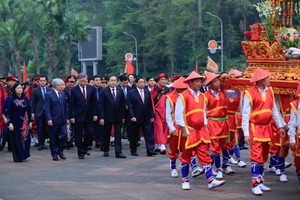The Mekong River Commission (MRC) has emphasized the need to proceed carefully in considering dam projects on the mainstream Mekong River, as a wide ranging assessment of Mekong hydropower development begins this week.

“The Mekong River system is a highly productive and valuable, but at the same time, fragile resource,” Jeremy Bird, Chief Executive Officer of the MRC Secretariat, said in an MRC statement issued May 28.
He added, “Before any decisions are made to implement mainstream hydropower schemes in the lower Mekong basin, the four lower Mekong countries have agreed to work together to cultivate a better scientific understanding of the wider development impact and to ensure that private sector proposals for new dams are guided by principles of economic, environmental and social sustainability.”
His words came as the MRC launched a strategic assessment of the proposed mainstream developments in Laos, Cambodia and on the Lao-Thai border. The influence of upstream dams in China on the Lancang-Mekong River will also be included in the strategic environmental assessment, according to the MRC announcement.
The MRC said it will use information presented by the study to improve its ability to guide member states in their decision processes and dialogue.
The MRC is the intergovernmental body responsible for cooperation on the sustainable management of the Mekong Basin whose members are Cambodia, Laos, Thailand and Vietnam. China and Myanmar are dialogue partners
The body said in that statement that the effect of the global financial crisis in Southeast Asia has provided a “breathing space,” allowing the four lower Mekong countries (Cambodia, Laos, Thailand and Vietnam) to take time to better assess how mainstream projects will affect the interests of all people in the Mekong River basin.
“The MRC is faced with perhaps its most important strategic challenge since the Mekong Agreement was signed in 1995 because of increased interest in building hydropower dams in the mainstream of the lower Mekong River Basin,” said Mr. Bird.
While there are already 3,235 MW of electricity being generated by hydropower on Mekong tributaries – and dams with an operational capacity of 3,209 MW are under construction, what is new is the interest of the private sector in seriously considering developing hydropower schemes on the mainstream.
The Mekong is one of the most active regions in the world for hydropower with eight existing or planned Mekong mainstream dams in Yunnan Province in China, where the Mekong is called the Lancang River, and 11 proposed by Cambodia, Laos and Thailand – all in various stages of investigation or feasibility study.
As set out in the 1995 Mekong Agreement, MRC member countries are committed to undergoing a formal approval process prior to any decision on building dams on the river.
The MRC says the process must balance the interests of people’s livelihoods, as well as the energy, fisheries, tourism, and navigation industries. Projects being studied for development in the lower Mekong Basin come to the commission for consultation, with a view to assisting member countries to reach consensus on the critical and sensitive issues of their shared water resources and the balanced development of the river.
Past studies undertaken by the MRC have shown that dams can have both a positive and negative impact. For example, MRC analysis shows that large storage dams in the upper Mekong basin can increase dry season flows and reduce flood levels, which can benefit water users.
But at the same time the changed flow patterns can reduce fisheries yield. The largest impacts of the proposed mainstream dams in the lower Mekong Basin apart from local resettlement issues are likely to be significant changes in fish passage and migration, aquatic habitats, sediment flow leading to erosion and loss of nutrients, according to the studies.
More than 60 million people in the lower Mekong basin depend on the river system for food, transport and economic activity, according to the MRC.
The MRC statement also said that the Electricity Generating Authority of Thailand (Egat) recently announced it has reduced the amount of power it plans to import over the next 15 years, to about 5,000 Megawatts from an earlier estimated figure of 13,000 which reflects the impact of the global economic downturn.
























